Technology to Support Independent Living in Health and Social Care
VerifiedAdded on 2024/05/29
|17
|4578
|297
Report
AI Summary
This report explores the role of technology in supporting independent living for individuals within the health and social care system. It begins by explaining how assistive technology (AT) aids users in daily activities, communication, mobility, health monitoring, and drug administration, thereby reducing reliance on caregivers. The report then analyzes barriers to technology adoption, including financial constraints, maintenance challenges, and the need for customization, using the case of Sally, a multiple sclerosis patient, to illustrate these points. Furthermore, it discusses the benefits of AT for both users and healthcare organizations, highlighting improvements in autonomy, health safety, and community engagement. The report also addresses health and safety considerations, ethical issues such as privacy and autonomy, and the impact of emerging technologies. It includes recommendations for technology to support independent living and evaluates the usefulness of technology for health and social care users, concluding that while AT offers significant benefits, careful consideration of individual needs and potential barriers is essential for successful implementation.
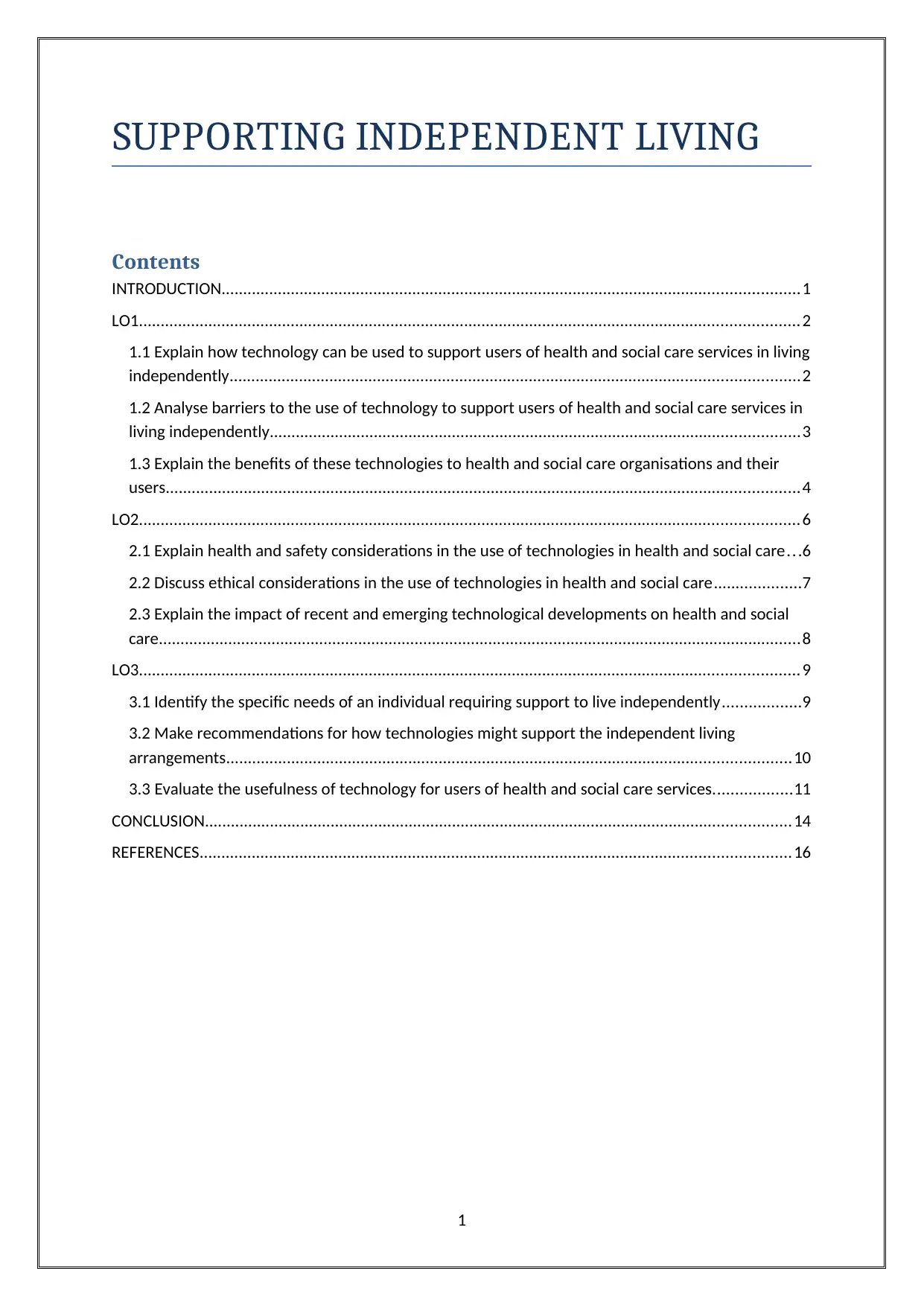
SUPPORTING INDEPENDENT LIVING
Contents
INTRODUCTION.....................................................................................................................................1
LO1........................................................................................................................................................2
1.1 Explain how technology can be used to support users of health and social care services in living
independently...................................................................................................................................2
1.2 Analyse barriers to the use of technology to support users of health and social care services in
living independently..........................................................................................................................3
1.3 Explain the benefits of these technologies to health and social care organisations and their
users..................................................................................................................................................4
LO2........................................................................................................................................................6
2.1 Explain health and safety considerations in the use of technologies in health and social care...6
2.2 Discuss ethical considerations in the use of technologies in health and social care....................7
2.3 Explain the impact of recent and emerging technological developments on health and social
care....................................................................................................................................................8
LO3........................................................................................................................................................9
3.1 Identify the specific needs of an individual requiring support to live independently..................9
3.2 Make recommendations for how technologies might support the independent living
arrangements..................................................................................................................................10
3.3 Evaluate the usefulness of technology for users of health and social care services..................11
CONCLUSION.......................................................................................................................................14
REFERENCES........................................................................................................................................16
1
Contents
INTRODUCTION.....................................................................................................................................1
LO1........................................................................................................................................................2
1.1 Explain how technology can be used to support users of health and social care services in living
independently...................................................................................................................................2
1.2 Analyse barriers to the use of technology to support users of health and social care services in
living independently..........................................................................................................................3
1.3 Explain the benefits of these technologies to health and social care organisations and their
users..................................................................................................................................................4
LO2........................................................................................................................................................6
2.1 Explain health and safety considerations in the use of technologies in health and social care...6
2.2 Discuss ethical considerations in the use of technologies in health and social care....................7
2.3 Explain the impact of recent and emerging technological developments on health and social
care....................................................................................................................................................8
LO3........................................................................................................................................................9
3.1 Identify the specific needs of an individual requiring support to live independently..................9
3.2 Make recommendations for how technologies might support the independent living
arrangements..................................................................................................................................10
3.3 Evaluate the usefulness of technology for users of health and social care services..................11
CONCLUSION.......................................................................................................................................14
REFERENCES........................................................................................................................................16
1
Paraphrase This Document
Need a fresh take? Get an instant paraphrase of this document with our AI Paraphraser
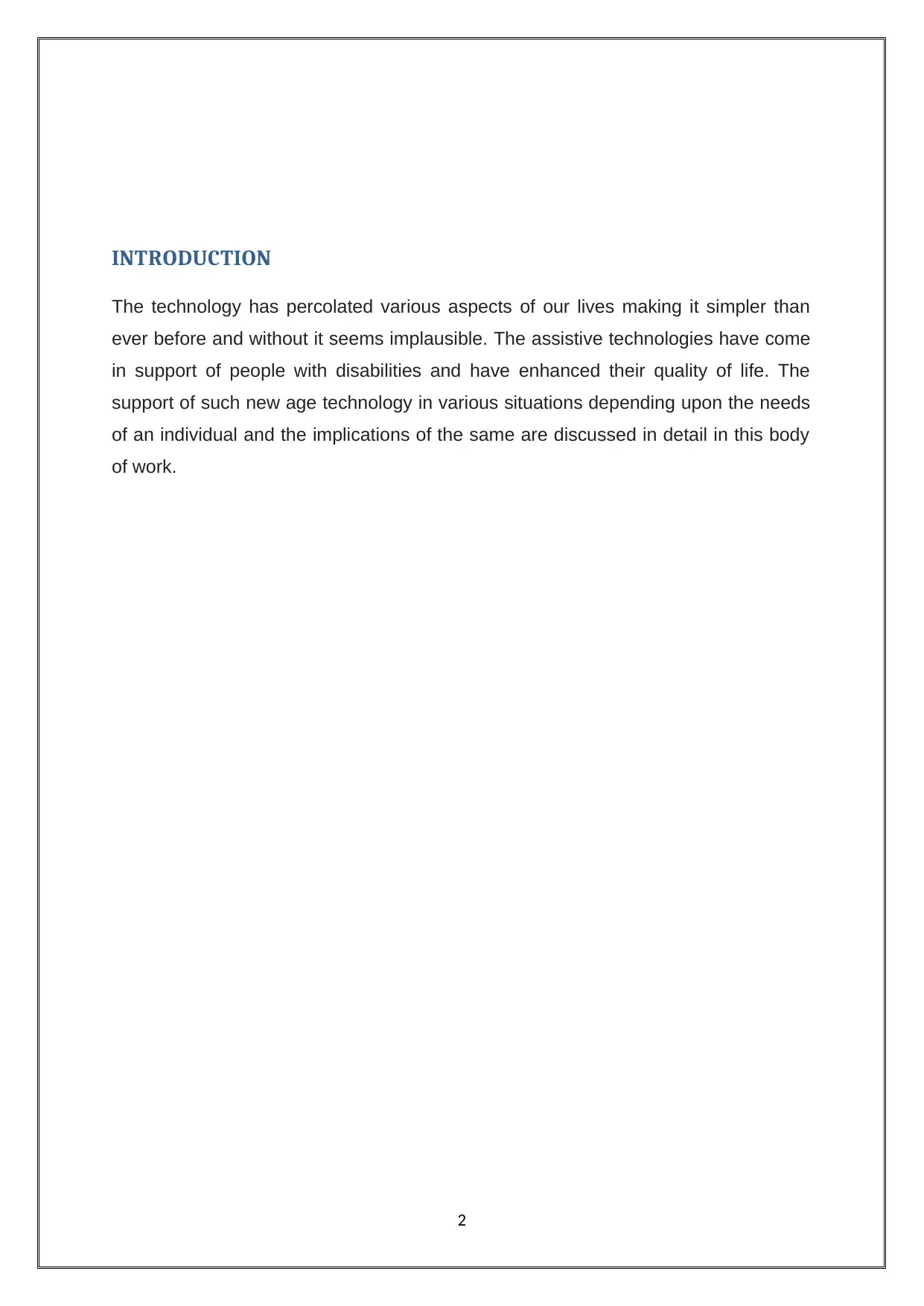
INTRODUCTION
The technology has percolated various aspects of our lives making it simpler than
ever before and without it seems implausible. The assistive technologies have come
in support of people with disabilities and have enhanced their quality of life. The
support of such new age technology in various situations depending upon the needs
of an individual and the implications of the same are discussed in detail in this body
of work.
2
The technology has percolated various aspects of our lives making it simpler than
ever before and without it seems implausible. The assistive technologies have come
in support of people with disabilities and have enhanced their quality of life. The
support of such new age technology in various situations depending upon the needs
of an individual and the implications of the same are discussed in detail in this body
of work.
2
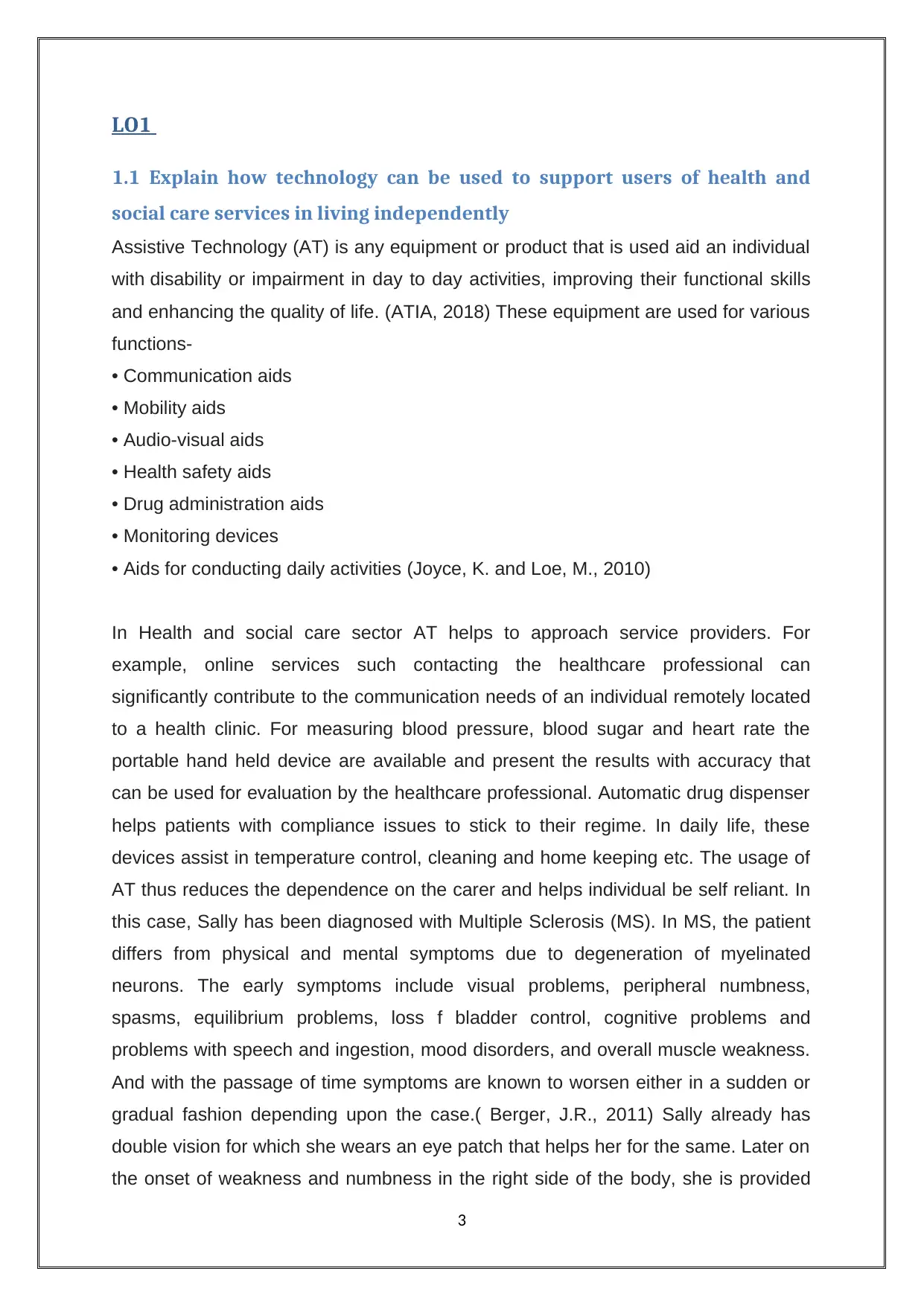
LO1
1.1 Explain how technology can be used to support users of health and
social care services in living independently
Assistive Technology (AT) is any equipment or product that is used aid an individual
with disability or impairment in day to day activities, improving their functional skills
and enhancing the quality of life. (ATIA, 2018) These equipment are used for various
functions-
• Communication aids
• Mobility aids
• Audio-visual aids
• Health safety aids
• Drug administration aids
• Monitoring devices
• Aids for conducting daily activities (Joyce, K. and Loe, M., 2010)
In Health and social care sector AT helps to approach service providers. For
example, online services such contacting the healthcare professional can
significantly contribute to the communication needs of an individual remotely located
to a health clinic. For measuring blood pressure, blood sugar and heart rate the
portable hand held device are available and present the results with accuracy that
can be used for evaluation by the healthcare professional. Automatic drug dispenser
helps patients with compliance issues to stick to their regime. In daily life, these
devices assist in temperature control, cleaning and home keeping etc. The usage of
AT thus reduces the dependence on the carer and helps individual be self reliant. In
this case, Sally has been diagnosed with Multiple Sclerosis (MS). In MS, the patient
differs from physical and mental symptoms due to degeneration of myelinated
neurons. The early symptoms include visual problems, peripheral numbness,
spasms, equilibrium problems, loss f bladder control, cognitive problems and
problems with speech and ingestion, mood disorders, and overall muscle weakness.
And with the passage of time symptoms are known to worsen either in a sudden or
gradual fashion depending upon the case.( Berger, J.R., 2011) Sally already has
double vision for which she wears an eye patch that helps her for the same. Later on
the onset of weakness and numbness in the right side of the body, she is provided
3
1.1 Explain how technology can be used to support users of health and
social care services in living independently
Assistive Technology (AT) is any equipment or product that is used aid an individual
with disability or impairment in day to day activities, improving their functional skills
and enhancing the quality of life. (ATIA, 2018) These equipment are used for various
functions-
• Communication aids
• Mobility aids
• Audio-visual aids
• Health safety aids
• Drug administration aids
• Monitoring devices
• Aids for conducting daily activities (Joyce, K. and Loe, M., 2010)
In Health and social care sector AT helps to approach service providers. For
example, online services such contacting the healthcare professional can
significantly contribute to the communication needs of an individual remotely located
to a health clinic. For measuring blood pressure, blood sugar and heart rate the
portable hand held device are available and present the results with accuracy that
can be used for evaluation by the healthcare professional. Automatic drug dispenser
helps patients with compliance issues to stick to their regime. In daily life, these
devices assist in temperature control, cleaning and home keeping etc. The usage of
AT thus reduces the dependence on the carer and helps individual be self reliant. In
this case, Sally has been diagnosed with Multiple Sclerosis (MS). In MS, the patient
differs from physical and mental symptoms due to degeneration of myelinated
neurons. The early symptoms include visual problems, peripheral numbness,
spasms, equilibrium problems, loss f bladder control, cognitive problems and
problems with speech and ingestion, mood disorders, and overall muscle weakness.
And with the passage of time symptoms are known to worsen either in a sudden or
gradual fashion depending upon the case.( Berger, J.R., 2011) Sally already has
double vision for which she wears an eye patch that helps her for the same. Later on
the onset of weakness and numbness in the right side of the body, she is provided
3
⊘ This is a preview!⊘
Do you want full access?
Subscribe today to unlock all pages.

Trusted by 1+ million students worldwide
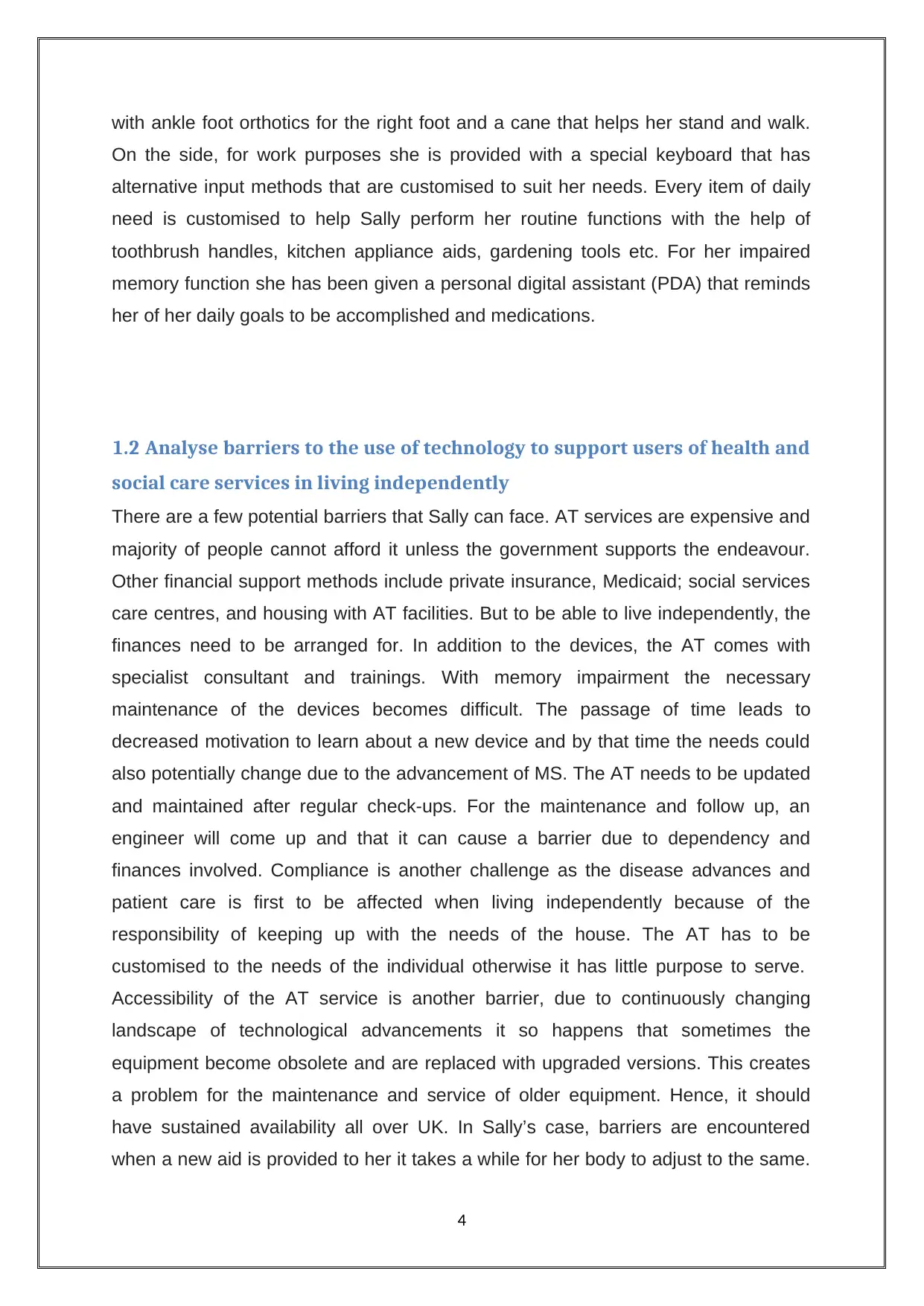
with ankle foot orthotics for the right foot and a cane that helps her stand and walk.
On the side, for work purposes she is provided with a special keyboard that has
alternative input methods that are customised to suit her needs. Every item of daily
need is customised to help Sally perform her routine functions with the help of
toothbrush handles, kitchen appliance aids, gardening tools etc. For her impaired
memory function she has been given a personal digital assistant (PDA) that reminds
her of her daily goals to be accomplished and medications.
1.2 Analyse barriers to the use of technology to support users of health and
social care services in living independently
There are a few potential barriers that Sally can face. AT services are expensive and
majority of people cannot afford it unless the government supports the endeavour.
Other financial support methods include private insurance, Medicaid; social services
care centres, and housing with AT facilities. But to be able to live independently, the
finances need to be arranged for. In addition to the devices, the AT comes with
specialist consultant and trainings. With memory impairment the necessary
maintenance of the devices becomes difficult. The passage of time leads to
decreased motivation to learn about a new device and by that time the needs could
also potentially change due to the advancement of MS. The AT needs to be updated
and maintained after regular check-ups. For the maintenance and follow up, an
engineer will come up and that it can cause a barrier due to dependency and
finances involved. Compliance is another challenge as the disease advances and
patient care is first to be affected when living independently because of the
responsibility of keeping up with the needs of the house. The AT has to be
customised to the needs of the individual otherwise it has little purpose to serve.
Accessibility of the AT service is another barrier, due to continuously changing
landscape of technological advancements it so happens that sometimes the
equipment become obsolete and are replaced with upgraded versions. This creates
a problem for the maintenance and service of older equipment. Hence, it should
have sustained availability all over UK. In Sally’s case, barriers are encountered
when a new aid is provided to her it takes a while for her body to adjust to the same.
4
On the side, for work purposes she is provided with a special keyboard that has
alternative input methods that are customised to suit her needs. Every item of daily
need is customised to help Sally perform her routine functions with the help of
toothbrush handles, kitchen appliance aids, gardening tools etc. For her impaired
memory function she has been given a personal digital assistant (PDA) that reminds
her of her daily goals to be accomplished and medications.
1.2 Analyse barriers to the use of technology to support users of health and
social care services in living independently
There are a few potential barriers that Sally can face. AT services are expensive and
majority of people cannot afford it unless the government supports the endeavour.
Other financial support methods include private insurance, Medicaid; social services
care centres, and housing with AT facilities. But to be able to live independently, the
finances need to be arranged for. In addition to the devices, the AT comes with
specialist consultant and trainings. With memory impairment the necessary
maintenance of the devices becomes difficult. The passage of time leads to
decreased motivation to learn about a new device and by that time the needs could
also potentially change due to the advancement of MS. The AT needs to be updated
and maintained after regular check-ups. For the maintenance and follow up, an
engineer will come up and that it can cause a barrier due to dependency and
finances involved. Compliance is another challenge as the disease advances and
patient care is first to be affected when living independently because of the
responsibility of keeping up with the needs of the house. The AT has to be
customised to the needs of the individual otherwise it has little purpose to serve.
Accessibility of the AT service is another barrier, due to continuously changing
landscape of technological advancements it so happens that sometimes the
equipment become obsolete and are replaced with upgraded versions. This creates
a problem for the maintenance and service of older equipment. Hence, it should
have sustained availability all over UK. In Sally’s case, barriers are encountered
when a new aid is provided to her it takes a while for her body to adjust to the same.
4
Paraphrase This Document
Need a fresh take? Get an instant paraphrase of this document with our AI Paraphraser
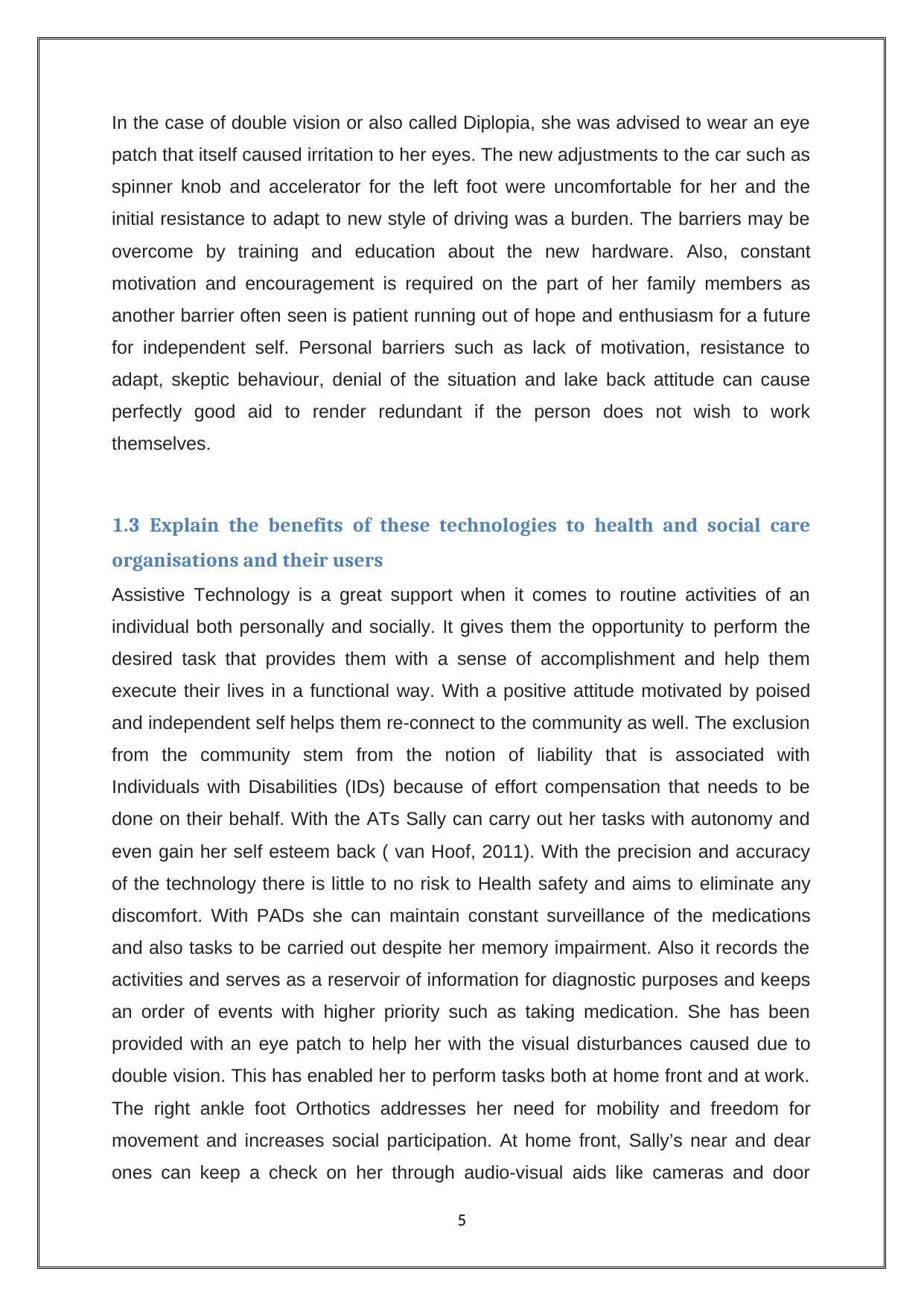
In the case of double vision or also called Diplopia, she was advised to wear an eye
patch that itself caused irritation to her eyes. The new adjustments to the car such as
spinner knob and accelerator for the left foot were uncomfortable for her and the
initial resistance to adapt to new style of driving was a burden. The barriers may be
overcome by training and education about the new hardware. Also, constant
motivation and encouragement is required on the part of her family members as
another barrier often seen is patient running out of hope and enthusiasm for a future
for independent self. Personal barriers such as lack of motivation, resistance to
adapt, skeptic behaviour, denial of the situation and lake back attitude can cause
perfectly good aid to render redundant if the person does not wish to work
themselves.
1.3 Explain the benefits of these technologies to health and social care
organisations and their users
Assistive Technology is a great support when it comes to routine activities of an
individual both personally and socially. It gives them the opportunity to perform the
desired task that provides them with a sense of accomplishment and help them
execute their lives in a functional way. With a positive attitude motivated by poised
and independent self helps them re-connect to the community as well. The exclusion
from the community stem from the notion of liability that is associated with
Individuals with Disabilities (IDs) because of effort compensation that needs to be
done on their behalf. With the ATs Sally can carry out her tasks with autonomy and
even gain her self esteem back ( van Hoof, 2011). With the precision and accuracy
of the technology there is little to no risk to Health safety and aims to eliminate any
discomfort. With PADs she can maintain constant surveillance of the medications
and also tasks to be carried out despite her memory impairment. Also it records the
activities and serves as a reservoir of information for diagnostic purposes and keeps
an order of events with higher priority such as taking medication. She has been
provided with an eye patch to help her with the visual disturbances caused due to
double vision. This has enabled her to perform tasks both at home front and at work.
The right ankle foot Orthotics addresses her need for mobility and freedom for
movement and increases social participation. At home front, Sally’s near and dear
ones can keep a check on her through audio-visual aids like cameras and door
5
patch that itself caused irritation to her eyes. The new adjustments to the car such as
spinner knob and accelerator for the left foot were uncomfortable for her and the
initial resistance to adapt to new style of driving was a burden. The barriers may be
overcome by training and education about the new hardware. Also, constant
motivation and encouragement is required on the part of her family members as
another barrier often seen is patient running out of hope and enthusiasm for a future
for independent self. Personal barriers such as lack of motivation, resistance to
adapt, skeptic behaviour, denial of the situation and lake back attitude can cause
perfectly good aid to render redundant if the person does not wish to work
themselves.
1.3 Explain the benefits of these technologies to health and social care
organisations and their users
Assistive Technology is a great support when it comes to routine activities of an
individual both personally and socially. It gives them the opportunity to perform the
desired task that provides them with a sense of accomplishment and help them
execute their lives in a functional way. With a positive attitude motivated by poised
and independent self helps them re-connect to the community as well. The exclusion
from the community stem from the notion of liability that is associated with
Individuals with Disabilities (IDs) because of effort compensation that needs to be
done on their behalf. With the ATs Sally can carry out her tasks with autonomy and
even gain her self esteem back ( van Hoof, 2011). With the precision and accuracy
of the technology there is little to no risk to Health safety and aims to eliminate any
discomfort. With PADs she can maintain constant surveillance of the medications
and also tasks to be carried out despite her memory impairment. Also it records the
activities and serves as a reservoir of information for diagnostic purposes and keeps
an order of events with higher priority such as taking medication. She has been
provided with an eye patch to help her with the visual disturbances caused due to
double vision. This has enabled her to perform tasks both at home front and at work.
The right ankle foot Orthotics addresses her need for mobility and freedom for
movement and increases social participation. At home front, Sally’s near and dear
ones can keep a check on her through audio-visual aids like cameras and door
5

sensors at times of need. This may in return help them establish a more sensitive
and strong bond with her. People can live their lives undaunted by their disabilities
and enjoy a good life with the aid of assistive technology.
6
and strong bond with her. People can live their lives undaunted by their disabilities
and enjoy a good life with the aid of assistive technology.
6
⊘ This is a preview!⊘
Do you want full access?
Subscribe today to unlock all pages.

Trusted by 1+ million students worldwide
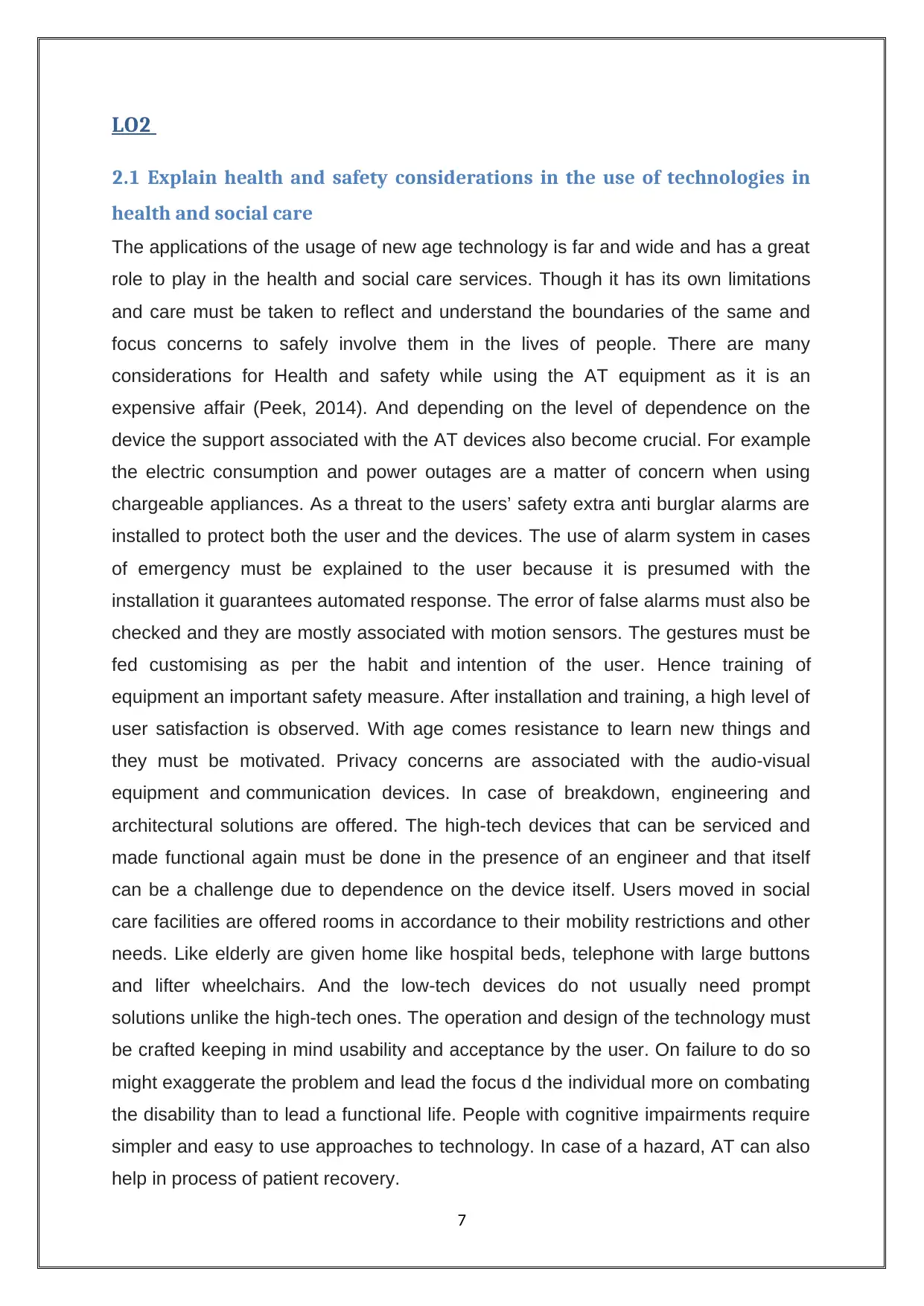
LO2
2.1 Explain health and safety considerations in the use of technologies in
health and social care
The applications of the usage of new age technology is far and wide and has a great
role to play in the health and social care services. Though it has its own limitations
and care must be taken to reflect and understand the boundaries of the same and
focus concerns to safely involve them in the lives of people. There are many
considerations for Health and safety while using the AT equipment as it is an
expensive affair (Peek, 2014). And depending on the level of dependence on the
device the support associated with the AT devices also become crucial. For example
the electric consumption and power outages are a matter of concern when using
chargeable appliances. As a threat to the users’ safety extra anti burglar alarms are
installed to protect both the user and the devices. The use of alarm system in cases
of emergency must be explained to the user because it is presumed with the
installation it guarantees automated response. The error of false alarms must also be
checked and they are mostly associated with motion sensors. The gestures must be
fed customising as per the habit and intention of the user. Hence training of
equipment an important safety measure. After installation and training, a high level of
user satisfaction is observed. With age comes resistance to learn new things and
they must be motivated. Privacy concerns are associated with the audio-visual
equipment and communication devices. In case of breakdown, engineering and
architectural solutions are offered. The high-tech devices that can be serviced and
made functional again must be done in the presence of an engineer and that itself
can be a challenge due to dependence on the device itself. Users moved in social
care facilities are offered rooms in accordance to their mobility restrictions and other
needs. Like elderly are given home like hospital beds, telephone with large buttons
and lifter wheelchairs. And the low-tech devices do not usually need prompt
solutions unlike the high-tech ones. The operation and design of the technology must
be crafted keeping in mind usability and acceptance by the user. On failure to do so
might exaggerate the problem and lead the focus d the individual more on combating
the disability than to lead a functional life. People with cognitive impairments require
simpler and easy to use approaches to technology. In case of a hazard, AT can also
help in process of patient recovery.
7
2.1 Explain health and safety considerations in the use of technologies in
health and social care
The applications of the usage of new age technology is far and wide and has a great
role to play in the health and social care services. Though it has its own limitations
and care must be taken to reflect and understand the boundaries of the same and
focus concerns to safely involve them in the lives of people. There are many
considerations for Health and safety while using the AT equipment as it is an
expensive affair (Peek, 2014). And depending on the level of dependence on the
device the support associated with the AT devices also become crucial. For example
the electric consumption and power outages are a matter of concern when using
chargeable appliances. As a threat to the users’ safety extra anti burglar alarms are
installed to protect both the user and the devices. The use of alarm system in cases
of emergency must be explained to the user because it is presumed with the
installation it guarantees automated response. The error of false alarms must also be
checked and they are mostly associated with motion sensors. The gestures must be
fed customising as per the habit and intention of the user. Hence training of
equipment an important safety measure. After installation and training, a high level of
user satisfaction is observed. With age comes resistance to learn new things and
they must be motivated. Privacy concerns are associated with the audio-visual
equipment and communication devices. In case of breakdown, engineering and
architectural solutions are offered. The high-tech devices that can be serviced and
made functional again must be done in the presence of an engineer and that itself
can be a challenge due to dependence on the device itself. Users moved in social
care facilities are offered rooms in accordance to their mobility restrictions and other
needs. Like elderly are given home like hospital beds, telephone with large buttons
and lifter wheelchairs. And the low-tech devices do not usually need prompt
solutions unlike the high-tech ones. The operation and design of the technology must
be crafted keeping in mind usability and acceptance by the user. On failure to do so
might exaggerate the problem and lead the focus d the individual more on combating
the disability than to lead a functional life. People with cognitive impairments require
simpler and easy to use approaches to technology. In case of a hazard, AT can also
help in process of patient recovery.
7
Paraphrase This Document
Need a fresh take? Get an instant paraphrase of this document with our AI Paraphraser
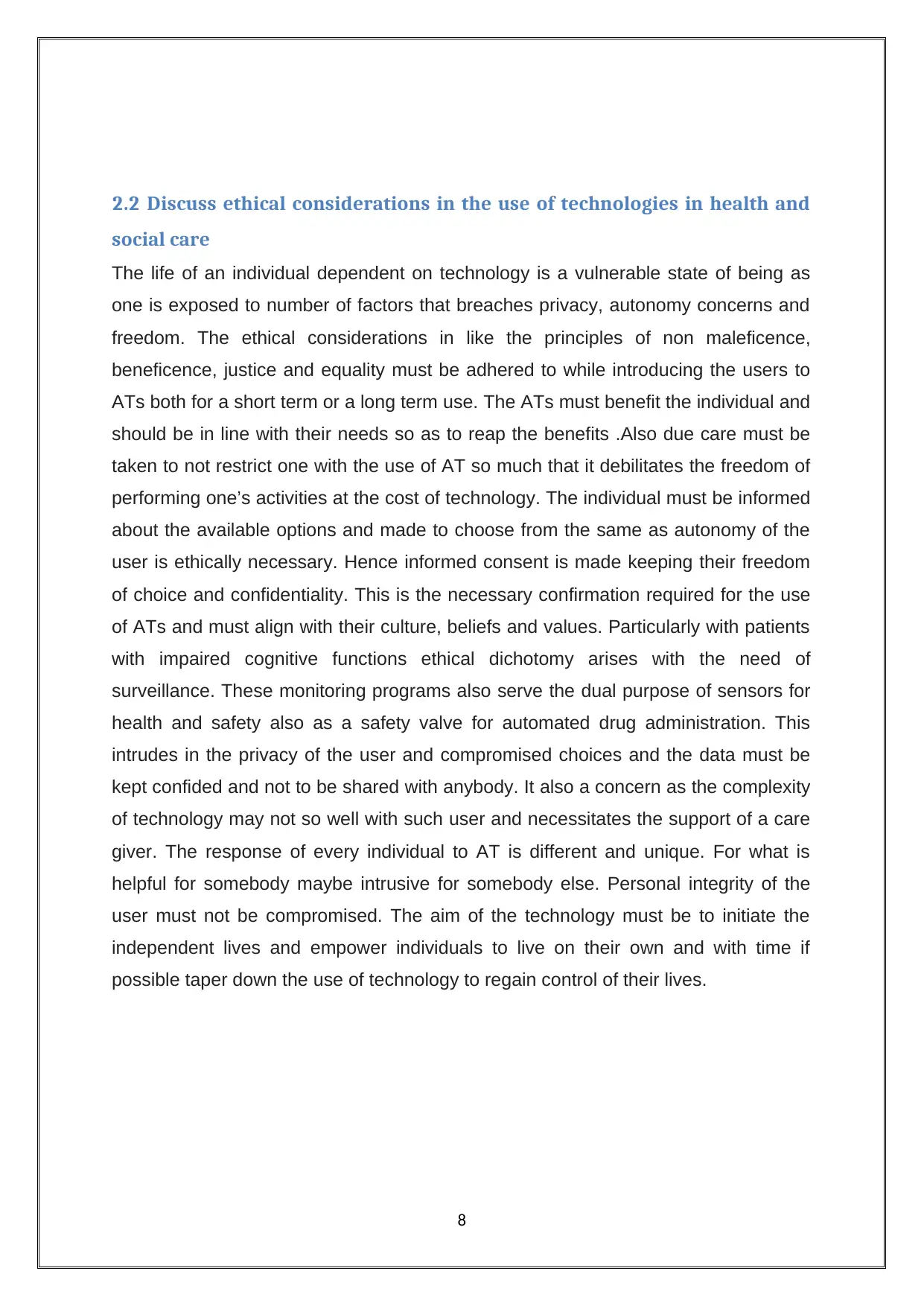
2.2 Discuss ethical considerations in the use of technologies in health and
social care
The life of an individual dependent on technology is a vulnerable state of being as
one is exposed to number of factors that breaches privacy, autonomy concerns and
freedom. The ethical considerations in like the principles of non maleficence,
beneficence, justice and equality must be adhered to while introducing the users to
ATs both for a short term or a long term use. The ATs must benefit the individual and
should be in line with their needs so as to reap the benefits .Also due care must be
taken to not restrict one with the use of AT so much that it debilitates the freedom of
performing one’s activities at the cost of technology. The individual must be informed
about the available options and made to choose from the same as autonomy of the
user is ethically necessary. Hence informed consent is made keeping their freedom
of choice and confidentiality. This is the necessary confirmation required for the use
of ATs and must align with their culture, beliefs and values. Particularly with patients
with impaired cognitive functions ethical dichotomy arises with the need of
surveillance. These monitoring programs also serve the dual purpose of sensors for
health and safety also as a safety valve for automated drug administration. This
intrudes in the privacy of the user and compromised choices and the data must be
kept confided and not to be shared with anybody. It also a concern as the complexity
of technology may not so well with such user and necessitates the support of a care
giver. The response of every individual to AT is different and unique. For what is
helpful for somebody maybe intrusive for somebody else. Personal integrity of the
user must not be compromised. The aim of the technology must be to initiate the
independent lives and empower individuals to live on their own and with time if
possible taper down the use of technology to regain control of their lives.
8
social care
The life of an individual dependent on technology is a vulnerable state of being as
one is exposed to number of factors that breaches privacy, autonomy concerns and
freedom. The ethical considerations in like the principles of non maleficence,
beneficence, justice and equality must be adhered to while introducing the users to
ATs both for a short term or a long term use. The ATs must benefit the individual and
should be in line with their needs so as to reap the benefits .Also due care must be
taken to not restrict one with the use of AT so much that it debilitates the freedom of
performing one’s activities at the cost of technology. The individual must be informed
about the available options and made to choose from the same as autonomy of the
user is ethically necessary. Hence informed consent is made keeping their freedom
of choice and confidentiality. This is the necessary confirmation required for the use
of ATs and must align with their culture, beliefs and values. Particularly with patients
with impaired cognitive functions ethical dichotomy arises with the need of
surveillance. These monitoring programs also serve the dual purpose of sensors for
health and safety also as a safety valve for automated drug administration. This
intrudes in the privacy of the user and compromised choices and the data must be
kept confided and not to be shared with anybody. It also a concern as the complexity
of technology may not so well with such user and necessitates the support of a care
giver. The response of every individual to AT is different and unique. For what is
helpful for somebody maybe intrusive for somebody else. Personal integrity of the
user must not be compromised. The aim of the technology must be to initiate the
independent lives and empower individuals to live on their own and with time if
possible taper down the use of technology to regain control of their lives.
8
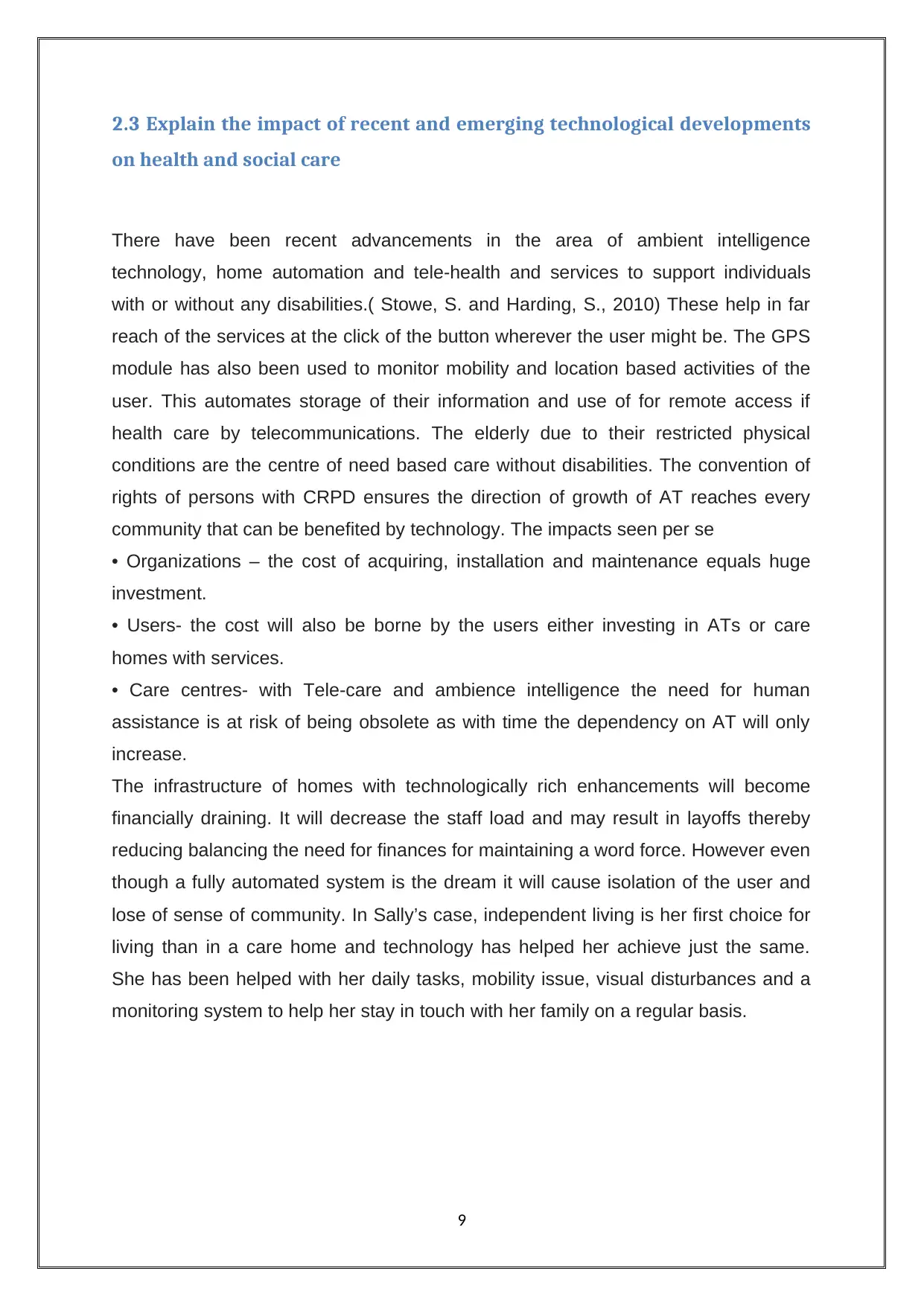
2.3 Explain the impact of recent and emerging technological developments
on health and social care
There have been recent advancements in the area of ambient intelligence
technology, home automation and tele-health and services to support individuals
with or without any disabilities.( Stowe, S. and Harding, S., 2010) These help in far
reach of the services at the click of the button wherever the user might be. The GPS
module has also been used to monitor mobility and location based activities of the
user. This automates storage of their information and use of for remote access if
health care by telecommunications. The elderly due to their restricted physical
conditions are the centre of need based care without disabilities. The convention of
rights of persons with CRPD ensures the direction of growth of AT reaches every
community that can be benefited by technology. The impacts seen per se
• Organizations – the cost of acquiring, installation and maintenance equals huge
investment.
• Users- the cost will also be borne by the users either investing in ATs or care
homes with services.
• Care centres- with Tele-care and ambience intelligence the need for human
assistance is at risk of being obsolete as with time the dependency on AT will only
increase.
The infrastructure of homes with technologically rich enhancements will become
financially draining. It will decrease the staff load and may result in layoffs thereby
reducing balancing the need for finances for maintaining a word force. However even
though a fully automated system is the dream it will cause isolation of the user and
lose of sense of community. In Sally’s case, independent living is her first choice for
living than in a care home and technology has helped her achieve just the same.
She has been helped with her daily tasks, mobility issue, visual disturbances and a
monitoring system to help her stay in touch with her family on a regular basis.
9
on health and social care
There have been recent advancements in the area of ambient intelligence
technology, home automation and tele-health and services to support individuals
with or without any disabilities.( Stowe, S. and Harding, S., 2010) These help in far
reach of the services at the click of the button wherever the user might be. The GPS
module has also been used to monitor mobility and location based activities of the
user. This automates storage of their information and use of for remote access if
health care by telecommunications. The elderly due to their restricted physical
conditions are the centre of need based care without disabilities. The convention of
rights of persons with CRPD ensures the direction of growth of AT reaches every
community that can be benefited by technology. The impacts seen per se
• Organizations – the cost of acquiring, installation and maintenance equals huge
investment.
• Users- the cost will also be borne by the users either investing in ATs or care
homes with services.
• Care centres- with Tele-care and ambience intelligence the need for human
assistance is at risk of being obsolete as with time the dependency on AT will only
increase.
The infrastructure of homes with technologically rich enhancements will become
financially draining. It will decrease the staff load and may result in layoffs thereby
reducing balancing the need for finances for maintaining a word force. However even
though a fully automated system is the dream it will cause isolation of the user and
lose of sense of community. In Sally’s case, independent living is her first choice for
living than in a care home and technology has helped her achieve just the same.
She has been helped with her daily tasks, mobility issue, visual disturbances and a
monitoring system to help her stay in touch with her family on a regular basis.
9
⊘ This is a preview!⊘
Do you want full access?
Subscribe today to unlock all pages.

Trusted by 1+ million students worldwide
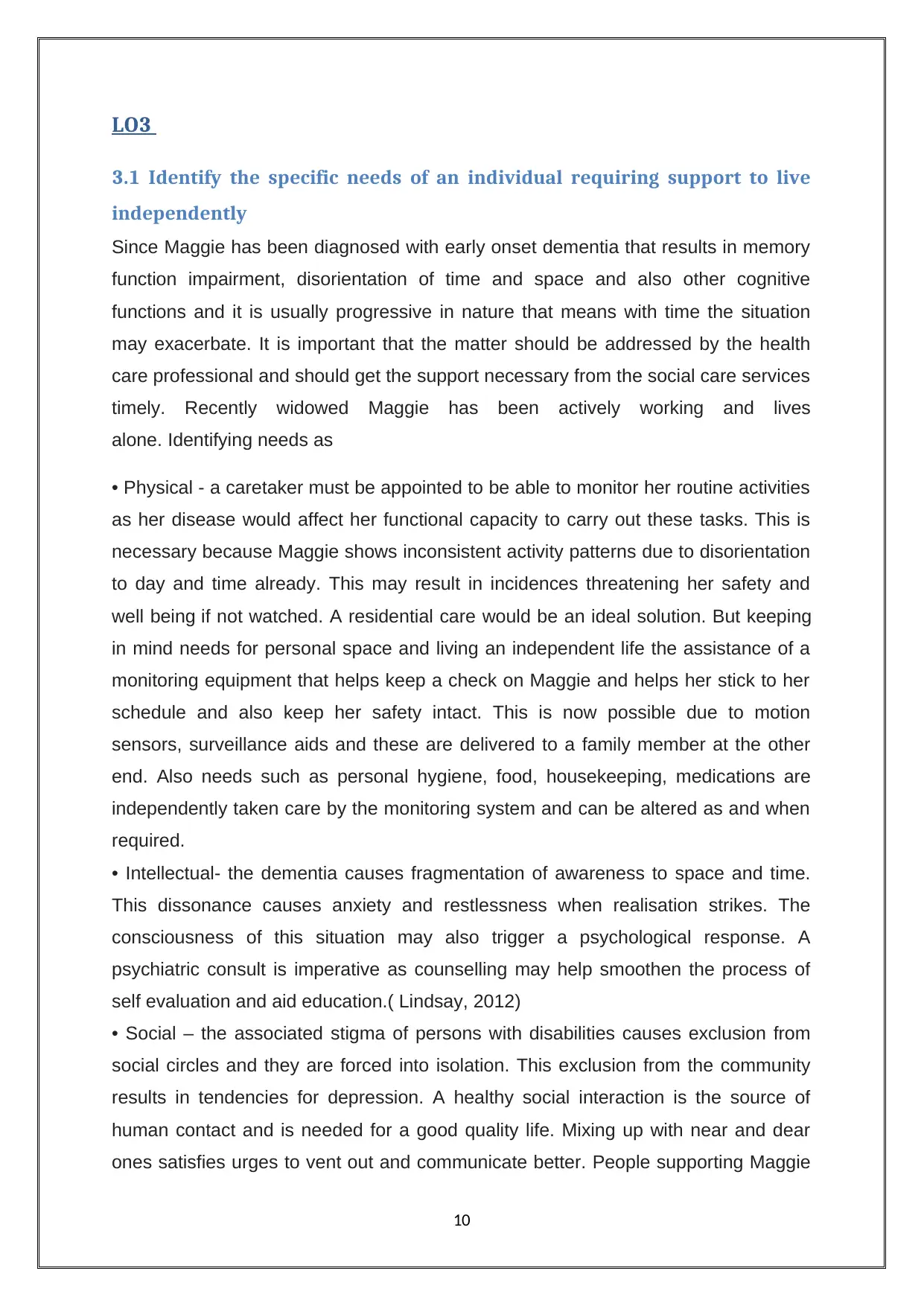
LO3
3.1 Identify the specific needs of an individual requiring support to live
independently
Since Maggie has been diagnosed with early onset dementia that results in memory
function impairment, disorientation of time and space and also other cognitive
functions and it is usually progressive in nature that means with time the situation
may exacerbate. It is important that the matter should be addressed by the health
care professional and should get the support necessary from the social care services
timely. Recently widowed Maggie has been actively working and lives
alone. Identifying needs as
• Physical - a caretaker must be appointed to be able to monitor her routine activities
as her disease would affect her functional capacity to carry out these tasks. This is
necessary because Maggie shows inconsistent activity patterns due to disorientation
to day and time already. This may result in incidences threatening her safety and
well being if not watched. A residential care would be an ideal solution. But keeping
in mind needs for personal space and living an independent life the assistance of a
monitoring equipment that helps keep a check on Maggie and helps her stick to her
schedule and also keep her safety intact. This is now possible due to motion
sensors, surveillance aids and these are delivered to a family member at the other
end. Also needs such as personal hygiene, food, housekeeping, medications are
independently taken care by the monitoring system and can be altered as and when
required.
• Intellectual- the dementia causes fragmentation of awareness to space and time.
This dissonance causes anxiety and restlessness when realisation strikes. The
consciousness of this situation may also trigger a psychological response. A
psychiatric consult is imperative as counselling may help smoothen the process of
self evaluation and aid education.( Lindsay, 2012)
• Social – the associated stigma of persons with disabilities causes exclusion from
social circles and they are forced into isolation. This exclusion from the community
results in tendencies for depression. A healthy social interaction is the source of
human contact and is needed for a good quality life. Mixing up with near and dear
ones satisfies urges to vent out and communicate better. People supporting Maggie
10
3.1 Identify the specific needs of an individual requiring support to live
independently
Since Maggie has been diagnosed with early onset dementia that results in memory
function impairment, disorientation of time and space and also other cognitive
functions and it is usually progressive in nature that means with time the situation
may exacerbate. It is important that the matter should be addressed by the health
care professional and should get the support necessary from the social care services
timely. Recently widowed Maggie has been actively working and lives
alone. Identifying needs as
• Physical - a caretaker must be appointed to be able to monitor her routine activities
as her disease would affect her functional capacity to carry out these tasks. This is
necessary because Maggie shows inconsistent activity patterns due to disorientation
to day and time already. This may result in incidences threatening her safety and
well being if not watched. A residential care would be an ideal solution. But keeping
in mind needs for personal space and living an independent life the assistance of a
monitoring equipment that helps keep a check on Maggie and helps her stick to her
schedule and also keep her safety intact. This is now possible due to motion
sensors, surveillance aids and these are delivered to a family member at the other
end. Also needs such as personal hygiene, food, housekeeping, medications are
independently taken care by the monitoring system and can be altered as and when
required.
• Intellectual- the dementia causes fragmentation of awareness to space and time.
This dissonance causes anxiety and restlessness when realisation strikes. The
consciousness of this situation may also trigger a psychological response. A
psychiatric consult is imperative as counselling may help smoothen the process of
self evaluation and aid education.( Lindsay, 2012)
• Social – the associated stigma of persons with disabilities causes exclusion from
social circles and they are forced into isolation. This exclusion from the community
results in tendencies for depression. A healthy social interaction is the source of
human contact and is needed for a good quality life. Mixing up with near and dear
ones satisfies urges to vent out and communicate better. People supporting Maggie
10
Paraphrase This Document
Need a fresh take? Get an instant paraphrase of this document with our AI Paraphraser
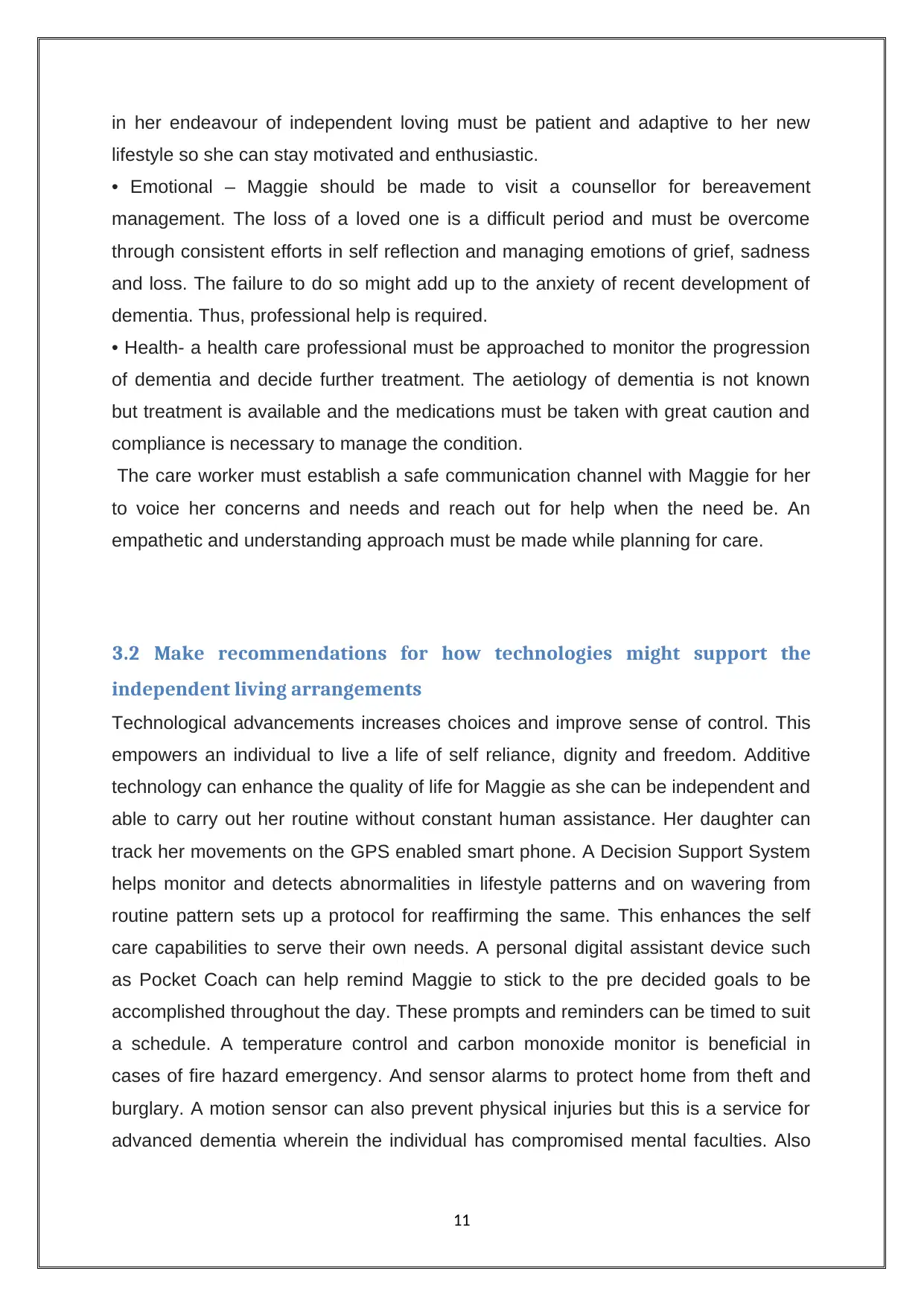
in her endeavour of independent loving must be patient and adaptive to her new
lifestyle so she can stay motivated and enthusiastic.
• Emotional – Maggie should be made to visit a counsellor for bereavement
management. The loss of a loved one is a difficult period and must be overcome
through consistent efforts in self reflection and managing emotions of grief, sadness
and loss. The failure to do so might add up to the anxiety of recent development of
dementia. Thus, professional help is required.
• Health- a health care professional must be approached to monitor the progression
of dementia and decide further treatment. The aetiology of dementia is not known
but treatment is available and the medications must be taken with great caution and
compliance is necessary to manage the condition.
The care worker must establish a safe communication channel with Maggie for her
to voice her concerns and needs and reach out for help when the need be. An
empathetic and understanding approach must be made while planning for care.
3.2 Make recommendations for how technologies might support the
independent living arrangements
Technological advancements increases choices and improve sense of control. This
empowers an individual to live a life of self reliance, dignity and freedom. Additive
technology can enhance the quality of life for Maggie as she can be independent and
able to carry out her routine without constant human assistance. Her daughter can
track her movements on the GPS enabled smart phone. A Decision Support System
helps monitor and detects abnormalities in lifestyle patterns and on wavering from
routine pattern sets up a protocol for reaffirming the same. This enhances the self
care capabilities to serve their own needs. A personal digital assistant device such
as Pocket Coach can help remind Maggie to stick to the pre decided goals to be
accomplished throughout the day. These prompts and reminders can be timed to suit
a schedule. A temperature control and carbon monoxide monitor is beneficial in
cases of fire hazard emergency. And sensor alarms to protect home from theft and
burglary. A motion sensor can also prevent physical injuries but this is a service for
advanced dementia wherein the individual has compromised mental faculties. Also
11
lifestyle so she can stay motivated and enthusiastic.
• Emotional – Maggie should be made to visit a counsellor for bereavement
management. The loss of a loved one is a difficult period and must be overcome
through consistent efforts in self reflection and managing emotions of grief, sadness
and loss. The failure to do so might add up to the anxiety of recent development of
dementia. Thus, professional help is required.
• Health- a health care professional must be approached to monitor the progression
of dementia and decide further treatment. The aetiology of dementia is not known
but treatment is available and the medications must be taken with great caution and
compliance is necessary to manage the condition.
The care worker must establish a safe communication channel with Maggie for her
to voice her concerns and needs and reach out for help when the need be. An
empathetic and understanding approach must be made while planning for care.
3.2 Make recommendations for how technologies might support the
independent living arrangements
Technological advancements increases choices and improve sense of control. This
empowers an individual to live a life of self reliance, dignity and freedom. Additive
technology can enhance the quality of life for Maggie as she can be independent and
able to carry out her routine without constant human assistance. Her daughter can
track her movements on the GPS enabled smart phone. A Decision Support System
helps monitor and detects abnormalities in lifestyle patterns and on wavering from
routine pattern sets up a protocol for reaffirming the same. This enhances the self
care capabilities to serve their own needs. A personal digital assistant device such
as Pocket Coach can help remind Maggie to stick to the pre decided goals to be
accomplished throughout the day. These prompts and reminders can be timed to suit
a schedule. A temperature control and carbon monoxide monitor is beneficial in
cases of fire hazard emergency. And sensor alarms to protect home from theft and
burglary. A motion sensor can also prevent physical injuries but this is a service for
advanced dementia wherein the individual has compromised mental faculties. Also
11
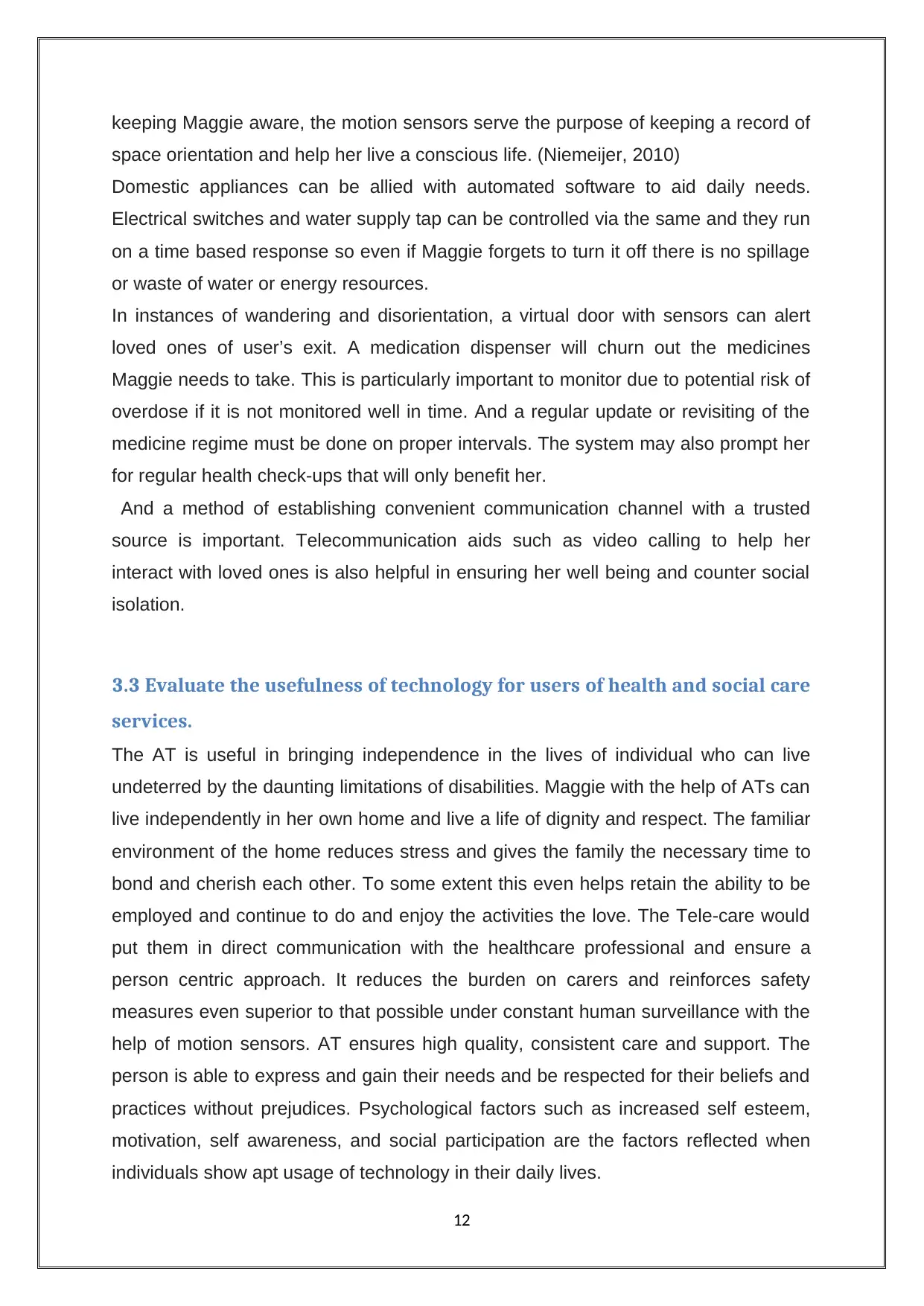
keeping Maggie aware, the motion sensors serve the purpose of keeping a record of
space orientation and help her live a conscious life. (Niemeijer, 2010)
Domestic appliances can be allied with automated software to aid daily needs.
Electrical switches and water supply tap can be controlled via the same and they run
on a time based response so even if Maggie forgets to turn it off there is no spillage
or waste of water or energy resources.
In instances of wandering and disorientation, a virtual door with sensors can alert
loved ones of user’s exit. A medication dispenser will churn out the medicines
Maggie needs to take. This is particularly important to monitor due to potential risk of
overdose if it is not monitored well in time. And a regular update or revisiting of the
medicine regime must be done on proper intervals. The system may also prompt her
for regular health check-ups that will only benefit her.
And a method of establishing convenient communication channel with a trusted
source is important. Telecommunication aids such as video calling to help her
interact with loved ones is also helpful in ensuring her well being and counter social
isolation.
3.3 Evaluate the usefulness of technology for users of health and social care
services.
The AT is useful in bringing independence in the lives of individual who can live
undeterred by the daunting limitations of disabilities. Maggie with the help of ATs can
live independently in her own home and live a life of dignity and respect. The familiar
environment of the home reduces stress and gives the family the necessary time to
bond and cherish each other. To some extent this even helps retain the ability to be
employed and continue to do and enjoy the activities the love. The Tele-care would
put them in direct communication with the healthcare professional and ensure a
person centric approach. It reduces the burden on carers and reinforces safety
measures even superior to that possible under constant human surveillance with the
help of motion sensors. AT ensures high quality, consistent care and support. The
person is able to express and gain their needs and be respected for their beliefs and
practices without prejudices. Psychological factors such as increased self esteem,
motivation, self awareness, and social participation are the factors reflected when
individuals show apt usage of technology in their daily lives.
12
space orientation and help her live a conscious life. (Niemeijer, 2010)
Domestic appliances can be allied with automated software to aid daily needs.
Electrical switches and water supply tap can be controlled via the same and they run
on a time based response so even if Maggie forgets to turn it off there is no spillage
or waste of water or energy resources.
In instances of wandering and disorientation, a virtual door with sensors can alert
loved ones of user’s exit. A medication dispenser will churn out the medicines
Maggie needs to take. This is particularly important to monitor due to potential risk of
overdose if it is not monitored well in time. And a regular update or revisiting of the
medicine regime must be done on proper intervals. The system may also prompt her
for regular health check-ups that will only benefit her.
And a method of establishing convenient communication channel with a trusted
source is important. Telecommunication aids such as video calling to help her
interact with loved ones is also helpful in ensuring her well being and counter social
isolation.
3.3 Evaluate the usefulness of technology for users of health and social care
services.
The AT is useful in bringing independence in the lives of individual who can live
undeterred by the daunting limitations of disabilities. Maggie with the help of ATs can
live independently in her own home and live a life of dignity and respect. The familiar
environment of the home reduces stress and gives the family the necessary time to
bond and cherish each other. To some extent this even helps retain the ability to be
employed and continue to do and enjoy the activities the love. The Tele-care would
put them in direct communication with the healthcare professional and ensure a
person centric approach. It reduces the burden on carers and reinforces safety
measures even superior to that possible under constant human surveillance with the
help of motion sensors. AT ensures high quality, consistent care and support. The
person is able to express and gain their needs and be respected for their beliefs and
practices without prejudices. Psychological factors such as increased self esteem,
motivation, self awareness, and social participation are the factors reflected when
individuals show apt usage of technology in their daily lives.
12
⊘ This is a preview!⊘
Do you want full access?
Subscribe today to unlock all pages.

Trusted by 1+ million students worldwide
1 out of 17
Related Documents
Your All-in-One AI-Powered Toolkit for Academic Success.
+13062052269
info@desklib.com
Available 24*7 on WhatsApp / Email
![[object Object]](/_next/static/media/star-bottom.7253800d.svg)
Unlock your academic potential
Copyright © 2020–2026 A2Z Services. All Rights Reserved. Developed and managed by ZUCOL.





